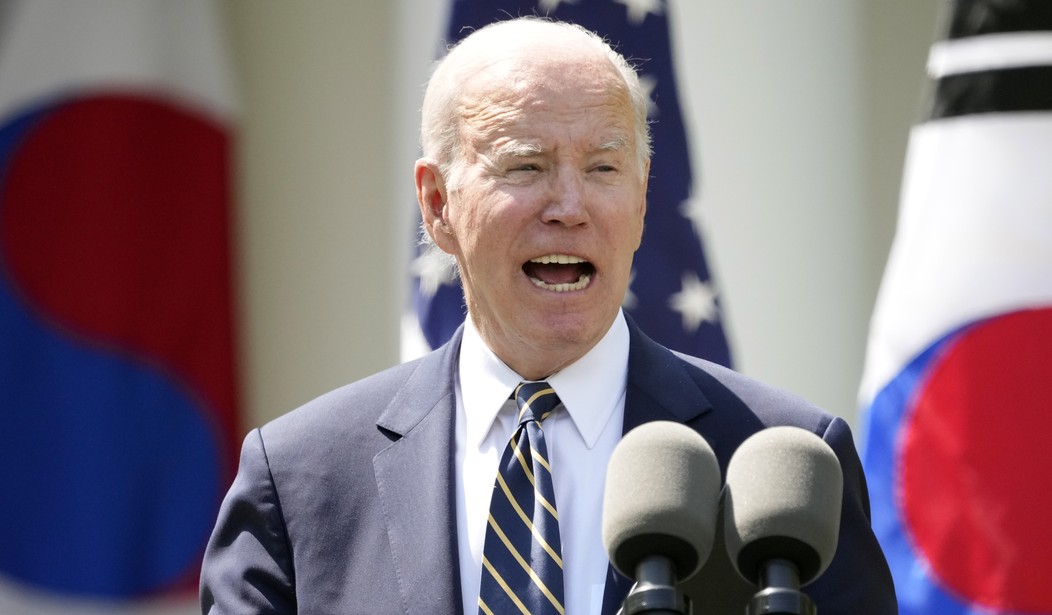For more than two years now, Republicans have been predicting that President Joe Biden's big-spending policies will crash the U.S. economy into recession. It hasn't happened yet, although the country did experience two consecutive quarters of negative economic growth -- a widely accepted definition of recession -- in the first and second quarters of 2022. But the economy climbed back into positive growth territory in the next quarter and has stayed there since.
Now, it's struggling. Well, it's always been struggling, but now it is more clearly struggling. The government reports that GDP grew at an anemic 1.1% annual rate in the first quarter of 2023. "Growth in the U.S. slowed considerably during the first three months of the year as interest rate increases and inflation took hold of an economy largely expected to decelerate even further ahead," reported CNBC.
If the economy is growing at a 1.1% rate now, and that rate is expected to "decelerate even further," then a recession could well be on the way. "The chance that a recession will have begun this year in the U.S. is probably about 70 percent," Harvard economist and former Treasury Secretary Lawrence Summers tweeted a couple of weeks ago.
So say a recession does indeed come. How does that play out politically in the 2024 election? The answer should be obvious -- it hurts the party in power. But nothing is entirely obvious these days.
Yes, the greatest political burden should be on Biden. Just as Republicans charge, the president bears some personal responsibility for the slowing economy, having pushed policies, mainly stratospheric government spending, that made the recession more likely. So Biden could be campaigning for reelection during a recession he helped cause.
That should be a disaster for both Biden and the Democratic Party. But Biden has a strategy that has already begun to emerge: He will tell voters that things are, in fact, going well for them, that he has done so, so much for them, and what really matters is MAGA. Americans should be so afraid of Make America Great Again Republicans, even if former President Donald Trump is not on the GOP ticket, that they should vote to keep a president who brought on a recession.
Recommended
By old political calculations, that would seem an impossible task for Biden. It's always "the economy, stupid," isn't it? Yes, until the most recent midterm elections suggested otherwise. In those elections, as in elections past, voters told pollsters that the economy was their most important issue. But then they actually voted. And while the economy was indeed important, the issue's role in the election did not come out precisely as expected.
Exit pollsters asked more than 18,000 respondents how they rated the condition of the economy. Almost nobody, just 2%, said the economy was "excellent." A bigger but still fairly small group, 21%, said the economy was "good." Together, that's less than one-quarter of those polled who had a positive assessment of the economy. A larger group, 38%, said the economy was "not so good," and an equally large group -- again, 38% -- said the condition of the economy was "poor."
The number of people who said the economy was "excellent" was too small to be broken down by party. But of those who said the economy was "good," an overwhelming number, 89%, voted for Democrats. On the other side, of those who said the economy was "poor," an equally overwhelming number, 88%, voted for Republicans. But what about that large group who said the economy was "not so good"? A significant majority of them, 62%, voted for Democrats. That made the difference in some Democratic victories.
How did that happen? How were Democrats, the party in total control of Washington, able to convince 62% of voters who were troubled by the economy to vote for the party in power? How did they do that? Yes, abortion played a role (and is likely to play a similar role, helping some Democrats, in 2024). But beyond that was Biden's, and his party's, ability to frame the race as a referendum on MAGA, even a referendum on whether American democracy will survive.
It is already clear that Biden intends to try it again in 2024. And it is the Republicans' task to 1) convince voters that the economy is, in fact, the most important issue in the election, and 2) convince voters that Republicans can bring the U.S. back to prosperity.
Now, there is growing evidence that economic conditions might make the Republican campaign case both more important and easier to make. The latest news makes clear that both inflation and the threat of recession remain serious. "We're not making great progress on inflation," Douglas Holtz-Eakin, a former head of the Congressional Budget Office, told Fox Business recently. "The Fed has done a lot and accomplished little." And on the possibility of recession, Holtz-Eakin added: "I am among those who is really worried about getting through this year without a recession. I see the second half as very rough."
This content originally appeared on the Washington Examiner at washingtonexaminer.com/opinion/recession-and-the-2024-campaign.
(Byron York is chief political correspondent for The Washington Examiner. For a deeper dive into many of the topics Byron covers, listen to his podcast, The Byron York Show, available on the Ricochet Audio Network at ricochet.com/series/byron-york-show and everywhere else podcasts are found.)

























Join the conversation as a VIP Member